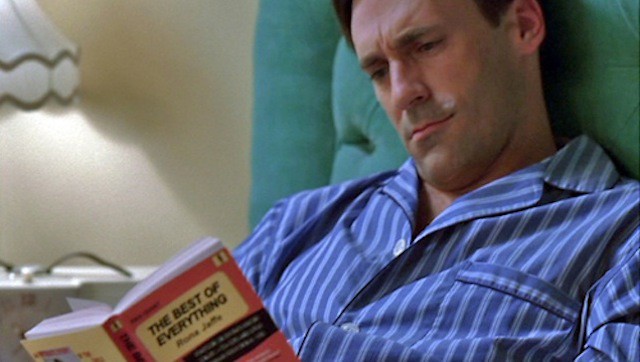Hello to All That: 10 Books For Recent Grads
by Alexis Coe

Long before Girls debuted, I was addicted to books featuring eye-on-the-main-chance nouvelles. This yen becomes particularly intense in the month of May, when a slew of new graduates set out for cities big and small, where they’ll work hard, take risks, and make a lot of mistakes. They will triumphantly secure dilapidated apartments and promptly learn to loathe them. Their suitors will be puerile and sophisticated, reckless and devoted. Some friends will become like family, while others will simply disappear. Mercurial bosses and duplicitous colleagues usually make an appearance. The women themselves are certainly imperfect characters, but they’re almost always intelligent, a bit peculiar, and above all, hell-bent on living life to the fullest.
I’ve compiled a list of books starring adventurous twenty-somethings, intended for those who’ve just collected their own diplomas or who simply feel a similar affinithy for the genre. There are some cautionary tales among them, yet most are inspiring, some instructive, and a few downright maddening, but all of the titles are utterly charming in their own way.
Girls in The City
Sixty years later, Rona Jaffe’s The Best of Everything is still an unerringly relatable tale about young women trying to make it out of the typing pool. Big dreams meet reality in a 1950s publishing house, but isn’t all highballs and Manhattan literati. Think Mad Men era mores, literally: Don Draper is seen reading it in Season 2.
Amor Towles’ The Rules of Civility is self-assured and intricately plotted, and it’s somehow the writer’s first novel. Brooklynite Katya becomes Manhattantite Katey, and she’ll have just one year to hone her fast-paced, disarming wit before World War II begins in earnest — but not before she charms nearly everyone she meets. Her society shifts as fast as the boom-and-bust economy, but as the seemingly dashing Tinker muses, “from this vantage point Manhattan was simply so improbable, so wonderful, so obviously full of promise — that you wanted to approach it for the rest of your life without ever quite arriving.”
Lacey Yeager, the protagonist in Steve Martin’s extremely enjoyable, but faulty novel, An Object of Beauty, experiences the sort of rapid career ascension that would make her a case study in Lean In. Lacey doesn’t linger in Sotheby’s mailroom for long, and while she plays leading lady throughout, Martin’s near-fetishistic homage to the art world offers necessary respite from her caustic, opportunist dealings.
To the Continent
Unlike the other female characters on this list, the protagonist of Henry James’1878 Daisy Miller isn’t a college graduate, but she harbors great ambitions in Switzerland and Italy. The 18-year-old American’s disregard for the stifling social mores is not without heartbreak, but the beautiful Daisy gets a taste of European society and dazzling compatriots in this classic novella.
Gore Vidal wrote that Elaine Dundy’s The Dud Avocado “should be subtitled Daisy Miller’s Revenge,” because 21-year-old Sally Jay Gorce isn’t just another naïve American flirting with Paris — she’s out to conquer, champagne cocktail in hand. The aspiring actress is beautiful, witty (she describes her dress as Tyrolean Peasant, Bar Girl, and Dreaded Librarian) and so far ahead of her time (1958!) that it feels like we’re still playing catch up.
Edna O’Brien’s The Country Girls was banned shortly after it was published in 1960, and the Irish author’s own parish priest publicly set it on fire. The groundbreaking work cast a critical eye on a repressive, post-war Ireland, launching an entire generation of writers, including Colm Tóibín. The book would ultimately become an eponymous trilogy, but it all began with Kata and Baba, childhood friends who lit out for Dublin. One is romantic, the other independent, and their friendship tumultuous. Love, of course, changes everything, and lives once intertwined become concurrent.
Cliques after College
At Vassar, eight eclectic friends of the class of 1933 simply known as “the group” swore they wouldn’t become updated versions of their parents, but the real world makes such promises difficult. Mary McCathy’s The Group is a delightfully searing look at New England society, passionate (and far from it) endeavors, gender norms, and the vestiges of Ivy League elitism.
Many a J. Courtney Sullivan apologist have sheepishly professed love for Commencement, but there’s no shame in feeling kinship with Celia, Bree, Sally and April as they form unlikely friendships at Smith. The girls themselves greatly — and sometimes painfully — struggle with each other’s post-collegiate choices, but soon realize life without their friendships is a far worse fate.
The College Beau
Charlie Blakeman’s love for Sophie Wilder has not diminished since their falling out a decade prior, but their lives in New York have been separate, barely brushing up against the other. Despite the lacuna, little has changed when the two reconnect; they’re still in the throes of self-discovery — work, love, and family — through literature. Chris Beha’s frighteningly intelligent debut, What Happened to Sophie Wilder, feels like an old fashioned literary novel, with few jarring, contemporary intrusions. To my mind, no other title treats a modern person’s capacity for faith in such a complex, sincere manner.
Jeffrey Eugenides’ The Marriage Plot is a similar, but far more sophisticated, seemingly effortless version of Beha’s What Happened to Sophie Wilder. Can a novel featuring a 1980s love triangle that began at Brown, full of modern trappings like sexual freedom, feminism, prenup and divorce, contend with the great, amorous tales of the nineteenth century? Indeed, everything that Madeline, Leonard, and Mitchell endure swells less with present-day immediacy than timeless import.
Alexis Coe will be wishing her cousin Dana a hearty congraduations later this week. She writes Hammer Time, a new series at the Awl, and Read Local, a column at SF Weekly. Her work has appeared in The Millions, Slate, the Atlantic, and other publications. Follow her.